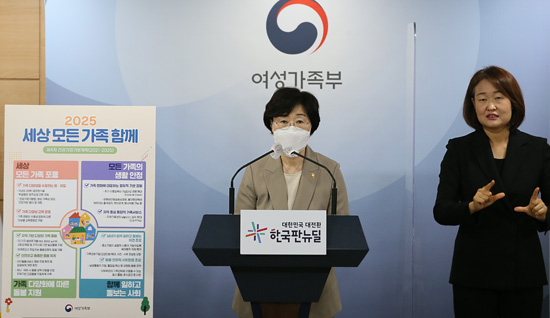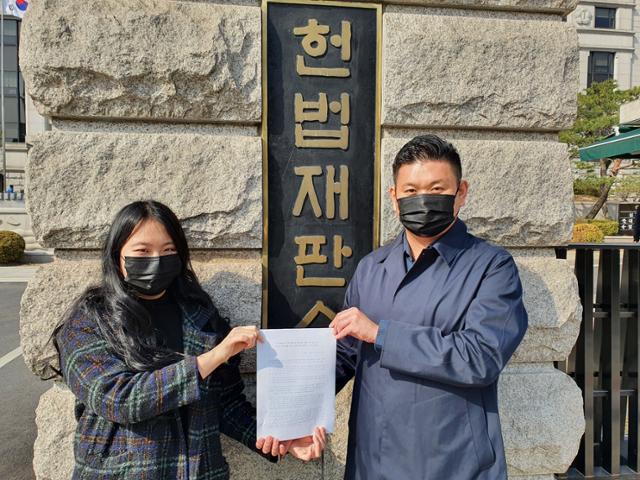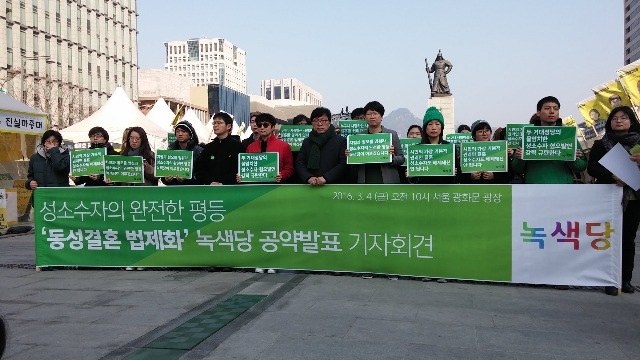The 4th Basic Plan for Healthy Families
: Navigating the 2021 Transition of Korean “Family”

▶ Minister of Gender Equality and Family Chung Young-ai announces the "fourth Basic Plan for Healthy Families" at the Central Government Complex on April 27th, 2021. © Ministry of Gender Equality and Family
2021 has been a very symbolic and dynamic year for Korean society regarding the concept of “family.” For instance, Sayuri Fujita, a well-known media personality and a voluntarily unmarried mother, began appearing on the parenting reality show titled The Return of Superman and aroused the discussion about the concept of “family.” It led to a controversy over “normal family views” and “the right to have children” via the Blue House National Petition and became one of the hottest topics. The social discussion has become more progressive as the Ministry of Gender Equality and Family (MOGEF) announced the 4th Basic Plan for Healthy Families (BPHF), which will be the basis for family policy promotion for the next five years. The new plan presents various policy proposals reflecting recent changes in families, including diversification of family forms and increased interest in family members’ rights. Among the numerous proposals, the abolition of the “prioritization of paternal surname” and the expansion of the family’s legal scope have been gaining great attention from society.
In this sense, The Sogang Herald portrays how the
abolition of the “prioritization of paternal surname” policy and the expansion
of the family’s legal scope would work, points out the background of the new
plan, and explores the factors that our society should consider.
The Abolition of the “Prioritization of Paternal Surname”
The first major policy proposal from the newest plan is to abolish the principle of “prioritization of paternal surname.” The principle literally means that when a newly born child is named, one’s father’s surname should be put first over the mother’s surname. It is applied in current Korean law as stated in Article 781 of the Civil Act. The status quo allows the maternal surname only when a couple has consulted to use it while reporting their marriage. Some exceptional cases are also allowed, such as cases of divorce, remarriage, and child out of wedlock. However, even in those cases, the legal system demands very complicated procedures including trials to change the surname and family clan of the child. It is known to be stricter for adults.
With this circumstance,
the 4th BPHF aims to abolish the principle by alleviating the barrier for the
use of maternal surnames. The proposal intends to amend the law to allow
parents to consult about the use of maternal/paternal surnames when reporting
the birth of a child, not their marriage. Given that most couples take a few
years to have a child after marriage, there
will be relatively more time available for parents to discuss the child’s
surname and proceed with the legal procedures.
The Background of the Abolition
The reasons for the government’s attempt to abolish the “prioritization of paternal surname” are to reflect on the social demand and realize gender equality regarding the law. The principle and Article 781 have been pointing out that legally forcing one to have a paternal surname as the default surname puts a father’s rights before a mother’s, which violates gender equality. This unfavorable view was well elucidated by activist Lee Seol-ah and her husband Jang Dong-hyun, who filed a constitutional complaint about the principle. The couple has gone through the above-mentioned complicated procedure with giving a maternal surname, and they have been full of questions such as “If a marriage is a relationship based on equal rights, why would an explicit agreement be mandatory only with the maternal surname?” Lee and Jang claimed that the current law infringes on the Constitution’s Article 36 Clause 1 and Article 10, and no legitimate legislative purpose can be found behind the discriminative law.
The condemning viewpoint on the current law has been sympathized with the public as well. According to the survey done by Korea Legal Aid Center for Family Relations in 2018, 67.6% out of approximately 3,000 respondents answered that “prioritization of paternal surname” is unreasonable, and 71.6% claimed that the child’s surname should be decided by their parents after deliberation as an alternative. The result shows that the mainstream opinion is to abolish the “prioritization of paternal surname” principle and apply the equivalent procedure to both paternal and maternal surnames. As reflecting reality is the principle that laws need to pursue, adhering to the “prioritization of paternal surname” would only be a very outdated decision far from reality.
Even the government and
the legal experts have begun acknowledging the reality and considered the
“prioritization of paternal surname” problematic. The Legislative Improvement
Committee for Inclusive Family Culture affiliated to the Ministry of Justice stated, “To realize equal marital
relationship in family life, it is recommended to revise Article 781 of Civil
Act completely by abolishing the principle of ‘prioritization of paternal surname’ and/or making parental consultation mandatory.” For these
reasons and backgrounds, eradicating the principle and allowing couples to
consult with a surname when reporting a birth would contribute to the
establishment of a system that embodies equal marital relationships and
respects autonomous agreements made by the family.

▶ Lee Seol-ah, left, and Jang Dong-hyun, an activist couple, visited the
Constitutional Court and filed a constitutional complaint to review the
constitutionality of the nation's family registration law on March 18th, 2021. © The Hankook Ilbo
The Factors to be Considered with the Abolition
Although the abolishment of the principle is
expected to bring positive impacts on our society, there are still some factors
that need to be considered and improved. First of all, since paternalism and “prioritization
of paternal surname” have remained strong as conventions for a long time, the
government should put in more effort and come up with devices to guarantee that
the marital agreements will be done in an equal and deliberate environment for
this abolishment to have practical effects. Furthermore, additional
explanations are needed for certain scenarios. What if the consultation between
parents is ruptured? What if the child is dissatisfied with their parents’
decision and desires to go by another surname? To reduce such potential
disruptions, rooms are remaining to be filled with and be prepared by the
government and the society.
The Expansion of the
Family’s Legal Scope
The other major policy proposal is expanding the
legal scope of the term “family.” For now, the concept of family is
restrictively defined as “the basic units consisting of marriage, blood ties,
and adoption.” The 4th BPHF is expected to amend the law so that the
legal concept of the family includes
cohabitation, de facto marriage, abused child fostering home, etc.
The Background of the Expansion
The background of expanding the legal scope of
the term “family” has to do with reflecting the social trend as the social
understanding of the family has altered. According to “the National Poll on
Family Diversity” done by the MOGEF, the percentage of people who considered
themselves a family if they share housing and livelihood, even if not in legal
marriages or blood-relationship, increased 2.2%p from the previous year, 69.7%.
Moreover, the new plan
intends to remove barriers that had to be faced if they were not legally
“family” despite practically sharing housing and livelihood. For example, the
current funeral law prohibits the cohabitant from holding a funeral of the
other unless they are
legally a “family” regardless of how long they have lived together. Also, in
the case of a de-facto marriage or a cohabitation relationship, it is
impossible to properly cope with urgent medical situations since they are
prohibited from filling out the consent form of surgery according to the Civil
Act. The new plan intends to reduce and prevent those problematic urgent
situations caused by formal obstacles, thereby increasing social utility.
The Factors to be Considered with the Expansion
Even if the enlargement of the legal scope of
“family” seems to be practical and optimistic, there are some factors that
could be viewed as unfavorable and unrealistic. First of all, there are
concerns about amending numerous laws that depend on what “family” means. For
example, distinguishing legal marriage from de facto marriage would also
inevitably alter depending on the legal definition of “family.” It is likely to
raise concerns about the fundamental shift of the relevant value systems and
social order. Also, since so many laws are related to the theme of “family,”
the process of reviewing and revising them will incur enormous time and costs.
Furthermore, some point out that the expanded legal scope of “family” could
bring about resistance to the religious community by raising concerns that it
could move toward recognition of same-sex marriage and homosexuality in the
upcoming future.
Nevertheless, there are
five years set for preparation. Since laws and
policies must reflect and demonstrate the social
status quo, the transition to a more inclusive “family” concept seems to be an
inevitable task for our society. Also, homosexuality and same-sex marriage part
are issues that should be discussed in full scale.
The Next Big Thing:
Same-Sex Marriage Legislation

▶ The Green Party Korea held a press conference at Gwanghwamun Square to announce its pledge to enact same-sex marriage legislation on March 4th, 2016. © Green Party Korea
Although the abolition of “paternal surname
first” was included in the 4th BPHF, Lee, who filed a constitutional
complaint, expressed her dissatisfaction with the plan as the same-sex marriage
legislation issue was excluded. Indeed, the arguments against the legislation
of same-sex marriage are becoming less convincing nowadays. The opponents of
the legislation argue that the family’s core function of “reproduction” cannot
be carried out in same-sex marriage and therefore cannot be legally recognized
as same as the
opposite-sex marriage. However, the opponents overlook that opposite-sex
marriage is not legally protected on the premise of “reproduction.” Given that
the birth rate in many nations including Korea has fallen dramatically and the
proportion of children born out of wedlock has increased, opposite-sex
marriage does not guarantee “reproduction” anymore.
If the “reproduction” is no more a realistic standard, and if there is no
difference in that both couples have very close economic, social, physical, and
mental relationships, there is no reason to treat same-sex marriage
differently.
While the traditional
arguments against same-sex marriage have been losing their persuasiveness, the
issue of same-sex marriage has never been practically mentioned for more than
30 years, due to the fear of a backlash from religious communities and the
advocates of traditional family systems. Nonetheless, efforts are needed at the
government level like mentioning same-sex marriage legislation in the BPHF to
lure interests in the legislation and to pave the way for practical and
comprehensive discussions in our society.
Conclusion
In addition to the legal abolishment of
“prioritization of paternal surname” and the “expansion of family’s legal
scope,” the 4th BPHF included a variety of initiatives such as
broadening the number of people eligible for child-care leave from wage workers
to all employees. However, as there is a saying that “There is no perfect
policy in the world,” these movements need attention, feedback, and social
discussions from the public to realize the goal as fast as possible. Therefore,
The Sogang Herald asks Sogangers to
focus on the 4th Basic Plan for Healthy Families and other
family-related issues that our society will face one day including the
aforementioned legislation of same-sex marriage.
By Jeon Kun-hee (Cub Reporter)
dkhjeon@sogang.ac.kr
[1] 슈퍼맨이 돌아왔다(KBS2)
[2] 제4차 건강가정기본계획
[3] 부성우선주의(父姓于先主義)
[4] Marriage and family life shall be entered
into and sustained on the basis of individual dignity and equality of the
sexes, and the State shall do everything in its power to achieve that goal.
[5] All citizens shall be assured of
human worth and dignity and have the right to pursuit of happiness. It shall be
the duty of the State to confirm and guarantee the fundamental and inviolable
human rights of individuals.
[6] 한국가정법률상담소
[7] 포용적 가족 문화를 위한 법제개선위원회
